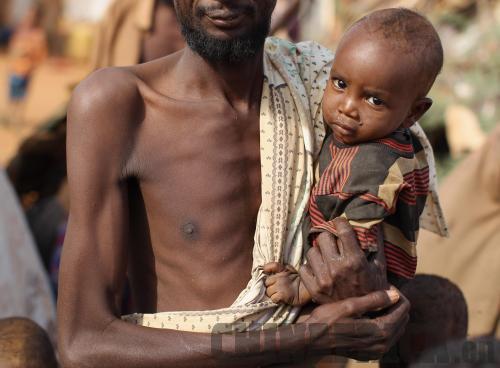|
 |
|
DESPERATE:Somalians look forward with hope to famine relief |
Two things happen when violent conflict and widespread famine meet - people die and those deaths grab headlines. And that's the reality of the sad news coming out of the Horn of Africa about drought, dire starvation and famine.
It all sounds far-fetched when you tell a person who has never slept on a hungry stomach about hunger, famine and the resultant death.
But this one-sentence story, from a Kenyan policeman deployed to the harsh northern terrain bordering the conflict-ridden Somalia, illustrates the suffering of the estimated 12.4 million people in four countries - Somalia, Djibouti, Ethiopia and Kenya - facing starvation.
The policeman said he stumbled upon two children suckling the flaccid breasts of their dead mother. Picture that.
Fathers who under normal circumstances should be standing tall for their families are on their knees, queuing and begging for food. Mothers, afraid of losing their children, leave the little food they get to the children and some die because of starvation. Some children have lost their parents, and with no one to look after them, their days are numbered.
From frying pan into fire
The refugees from Somalia are running away from the war and famine in their country, in search of food and safety in Kenya's Dadaab refugee camps. Though those in Somalia don't know it yet, going to Dadaab is a jump from the frying pan into the fire. The camp is hell; it is bursting with desperate people.
According to CARE, a leading humanitarian organization fighting global poverty, as of July 2011, some 1,300 refugees a day, the vast majority from war-torn Somalia, were pouring into the Dadaab refugee camps in Kenya - now the world's largest such site, with almost 400,000 displaced people in three camps originally designed for 90,000.
The complex of camps was first established as a temporary solution more than 20 years ago by the United Nations High Commission for Refugees (UNHCR), after Somalia descended into a civil war. The sanitation is poor, admission into the camp slow and rations are meager. The area is filled with mounds of soil marking the graves of those who didn't make it to the camp.
Bruno Le Maire, French Minister for Food, Agriculture, Fisheries, Rural Life and Town and Country Planning, who organized a crisis meeting in Rome on July 25, to mobilize funds for the support of the starving masses in the Horn of Africa, described the situation at the camp as something that the human conscience found "intolerable."
In his words, "This road of hope has turned into a road of death for thousands and thousands of refugees."
World Food Program (WFP) Executive Director Josette Sheeran told the meeting in Rome that 10,000 refugees are taking the dangerous trip across the border every week, because if they stay in Somalia, they will die. They are also likely to miss out on the aid because of the ban on relief supplies by al Shabaab militia, who are currently fighting Somalia's Transitional Federal Government.
While the African Union Mission in Somalia (AMISOM) peacekeeping troops in Somalia have managed to put the squeeze on al Shabaab, these militias remain a constant threat to aid workers. The good news is that the peacekeeping troops have managed to open up corridors for relief supplies to get to the needy.
Somalia's Transitional Government President Sheik Sherif Ahmedin is claiming victory after al Shabaab fighters began pulling out of Mogadishu in July. Officials say it is the most significant gain for the UN-backed transitional government in years. Al Shabaab says it is a change in military tactics rather than a retreat.
But politics continues to exacerbate the famine. In south Somalia the situation is dire, and more so, in the capital Mogadishu and regions like Afgoye, Gedo, Dawooli, Bay, Bakooli, plus the Shabelle districts. The United Nations Office for the Coordination of Humanitarian Affairs (OCHA) estimates that 3.7 million people, nearly one third of the 9.9 million Somali nationals, need food urgently.
Apart from war-torn Somalia, there's the drought-ravaged north of Kenya, the expansive dry lands in the south of South Sudan, plus shortage of food in southern Ethiopia and parts of Djibouti.
The famine has been dubbed the "children's famine" and nutrition experts have warned that there's a risk of losing a whole generation in the Horn of Africa if the situation is not curbed urgently. Research quoted in The American Journal of Clinical Nutrition, in an article by G Robert DeLong, shows a link between malnutrition and brain development - if a child is malnourished, the brain gets stunted and the results will show later in life.
Statistics from the World Bank Report 2011 also paint a grim picture. One out of every three children in Somalia under the age of five is malnourished; there are 180 deaths recorded per 1,000 children under the age of five.
|